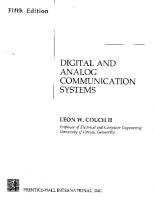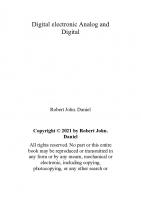Analog and Digital Communication Systems [chapters 1-6, 4 ed.]
303 80 58MB
English Pages 285 Year 1996
Recommend Papers
File loading please wait...
Citation preview
-~.. . .. .
.
Amplitude Modulation
: .
I,,
.
I .
: .
,
. :,
1
.. .
So& 6.2
Double-8idebnd Supprewed Carrier
The most
, frcsueacr signal to ma&rlste (i.e., modify thc paramctgs of) another, highpl fmquency aSgnal. Mast commndy, IME other signal is a pure sinwid. We start, then, witb a pun siousoid $At) called the carrier waveform. It is givan this nune because it is used to COWthc infowstlon signal from the lransmitter to thc d v u . -Y. sXt)
E,
I 1r
0
A
(2MJ+ 0)
I)
I.
If,& h properly c h c n , thiserrria waveform can be efficiently transmitted. For ex.Bplc.supporepwentdd~tRqiwodesinthc~ge~lMHasnd3MHz gqapmklamDBrw~8thcmmbsrdi.blyseotovcr~uptorbostm ~hlfyaueLastriu~f.Obeinsbir~~@punrinuaoidrlcsrrisrdd .. ~ paolir-.m w a v d a y t h o f inLbCmpof1 MHEto3MHzison tb~diggmQn,andm*aauof~krylth~beured, ~wwutmOqusaticm~rbrpncediag~~csaiawavdonn
cmlomrQowbe~inawaytbat(a)LbCheJkmdsdl4~~ aed@)thcinf~mwcwiahtodb~w8u~mthc~wwavCdOW h a way that it a n be reawntd LbC &vet. In other words, we aie asking whether ~isaomswaythstthc~d~arvry(heinf~~.~~wisyss,ss we now illwuate. The right-hand side of Eq. (6.1) Coatpins thrae panuaaeff that may be wied: tbe amplitude A, the fnqucacyf, aod the phpM 0. Using &e information signal to vary A. f, or 0 tadstomnpUndc~~~aadpikrrcnodulmim,nspectlvely. Wewill~w~efIicht~misshievsdfweachofthescthraecuea
wmwillJsotbat~ifmcve~hr%arll~1y~~&tbe c h L separation of the signals at ibe rafdvu is poasibk. In asdi* are will find it
aiticslto~~atbirdpopcrty:TheinfanrstiwaSgnal~t)muub~mv~IMefromme~v~~wrvefam;it~oabeofmuohluetomodifyaau' rkrwavefomtacfficicatt radrtrtioaaprabilityifw~no(npmdua &I) BCClEnTely at thc receiver. l l t b ~ ~ t 4 8 o s a ~ ~ o f 4 w p l i i m o d ~ . ~ tmtmmts ofirequeacy mi modoI.tim follow in thc next chapter.
ffwc~tbe~~of@CmiaofBp(6.1).thef&~~wawfamisslts: ~ ~ (=tA(t)cos ) (zM#+ 0)
(6.2)
~fwqosacyf,sad~~BireeafbEsat.~~A(f)~*iorsomshoariar~-
~ w i r h ~ ~ ~ d t t r b o ~ w a w s l l l e s r r i s d ~ ~ c h a n s Wc6i1nplify~ea~by~thst0=O.~Wiunotdtscl;myoftbe
.bsdcd,siace~~,~y~toatimsshiftof~~~.Atimsshift
oatconddaddistatioaha~ans~
Sffi a2
DouMwidsbsnd SupprwMd Carrier
adogous to ths hipwmuk rssult that multipliion of a sinusoid by snorner m w a dMiearmd~hrqscaoia.'Ilratis,
If- A B by s(i), whcn a(t) cmtaim a d u r n of freqwaolss between 0 and f,chb~~caabcrppIhdtambytamtoylddarrscllt~all suauad~ofmefr#lucaciea. piSmr 6.3iadicaas that the modula*d wavtfm sdt) contains wmponcnts with fleqwmiu bstweenf, -.f and& +f,. As Aslong as signals in this range of frequencies &amnit nffbbttly a d an ratema of mwnable lag& can be conrtructcd, we have ~ved~6ntofthetwopmMenrs.Letwpl~insnatorpicaluldio~.~fmbe S L H z m d f c b c 1 M H e . ~ t h c n ~ o f ~ ~ b y c b s ~ w v iannis~~,~tolp05,oOoHt.
Tbcdobgecrivcis~ofWdgnrlr.We~etbatif~~~-
~lrl~alinu~of~fc~adaDaberiof~on~~modulrtard roidQf~f&~Pouisreuvfmnsdmetwo~cPriardowovcdq ~~~,~1&tf~df~rn~byitltlll~~..~hirisill.oltntsd drsdA.SlseshdlsdrraeWh~.wrrdLrtoWMou~
apatio&PaAM. m(l d@%OD
. ..
.
n:,,r;-,.
,.'I
?:
8.'
' 8 '
.. -1-,
?.~
,
,
. ,
: ~ ~ ~ ~ . o a * r & & ( # , , & y l @ ' ~ & ! , & ( i a ~ ~ ~ :
,.
:
i,:
Amplitude Modulation
C
'ibir~onis~mthelpmemrrmcrssthrrtoscdmdrPwmC~cluria waveform. We Bnt draw tbe o d i m rt IA + s(t)] and -[A + s(t)].The h 4 waveform p a b d i d y bwhw Umsc tM ~ m ~We sU . ua fill in with a smooth. oscillpting wavcfonn
,
.
,
I,'
,
, '
oftBs~~~extsllc*damD.~beaaour*.ialbXof
afmDdDtties~mel~rbodsasucr.Tbs ua~bYlaul(iptgiqpwla).
9
Mghw potential hpoint B, all fom diodss an short circuits. This is qui the switch king closed. The only limit to the rate of switching is i q s e d by the pwtkrl diodes an not ideal (i.c.. thefhve a oonmn eaphmx). ~he~csnalsobe~~ishcdu*lleastiv*ebcaonlc&viccssuchae %onopaatiog between outoff and nafmtioa~&tl:tmndotor act8 as an opens
The Mcood bmpdclass of modulator we d d e r is the square-low mod&or.
[s,W
+ s2(t)l2= s:(t) + s:(r) + 2st(t)s,(fl
Ifs~(t) i)tbP informah aud s ~ ( tis) the c a u k , we havf [s(t) + cos 2 . 6 3 = 2 0 + cos 9Irff
+ Zs(r)cos 2.62
.
,
I..
M-wave re&%aion is cquivaknt to tfic nuhawid opemion of rakingtbe solutcvalue.Theootpltoftbe&uistba 810)
= (A + dt11Wdrl
butsinceweaclsumthntA +s(t)aeva~nega?ivc,wccnaly(eowponeattof v;rlmrigrsioget
sr(t) = IA
+ dt)llddA
Amplitude Modulation
qplleriQnrintkistsd
AM *WD SUPERHETERODYNElW8WR
mvclope of a waveform as an o u t l i ~ mat ~ ~foUow thc puks of thc attemps to follow this outline. Our intuitive definition
-- - - - - -
-~~- - - -
~
~
~~
----
- - --
~
-
~ -~~ ~-~~~ ~
~~
-
Tbe foregoing intuitive detiaitioa ib 18ot vay dsfyiog, since it applie.8 only to r nanow clam d s&. We lhrll now wrplorc a mihamtical ddinitioo of the a~vdope 1,
1.
11
'
~ b i d s a i e a l ~ ~ ~ ~ ~ - * f a t l l e o f o t m t o a ~ c b h ~ t i v
'f?~~prranve&psfakso b o r n as t b e w n 1 ~ & ~ 6 ) ) ~ b p c o t m a & o f$a c ~ ) vrvetbnar(t)is~asihecompk~~of~~h~~ortrisr~irgi~
w
h*tbi.~wrs'hrasdtbrtSV+fJlia~ID(h.hitoltbtaig h T b l r l r n o l t c l r o d o n w r b r s f .

![Modern digital and analog communication systems [5th ed]
9780190686840, 0190686847](https://ebin.pub/img/200x200/modern-digital-and-analog-communication-systems-5th-ed-9780190686840-0190686847.jpg)


![Digital and analog communication systems [8th, intl. ed]
9780132915380, 0273774212, 9780273774211, 0132915383](https://ebin.pub/img/200x200/digital-and-analog-communication-systems-8th-intl-ed-9780132915380-0273774212-9780273774211-0132915383.jpg)


![Modern Digital and Analog Commnunication Systems [4th ed.]
9780195331455](https://ebin.pub/img/200x200/modern-digital-and-analog-commnunication-systems-4thnbsped-9780195331455.jpg)


![Analog and Digital Communication Systems [chapters 1-6, 4 ed.]](https://ebin.pub/img/200x200/analog-and-digital-communication-systems-chapters-1-6-4nbsped.jpg)